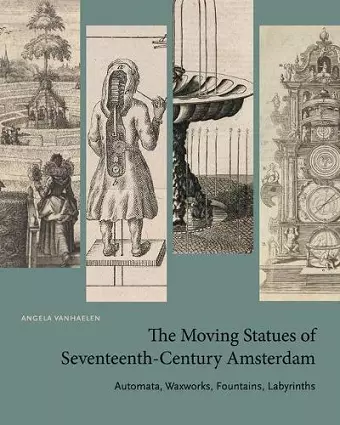The Moving Statues of Seventeenth-Century Amsterdam
Automata, Waxworks, Fountains, Labyrinths
Format:Hardback
Publisher:Pennsylvania State University Press
Published:8th Mar '22
Currently unavailable, and unfortunately no date known when it will be back
This hardback is available in another edition too:
- Paperback£33.95(9780271091600)

This book opens a window onto a fascinating and understudied aspect of the visual, material, intellectual, and cultural history of seventeenth-century Amsterdam: the role played by its inns and taverns, specifically the doolhoven.
Doolhoven were a type of labyrinth unique to early modern Amsterdam. Offering guest lodgings, these licensed public houses also housed remarkable displays of artwork in their gardens and galleries. The main attractions were inventive displays of moving mechanical figures (automata) and a famed set of waxwork portraits of the rulers of Protestant Europe. Publicized as the most innovative artworks on display in Amsterdam, the doolhoven exhibits presented the mercantile city as a global center of artistic and technological advancement. This evocative tour through the doolhoven pub gardens—where drinking, entertainment, and the acquisition of knowledge mingled in encounters with lively displays of animated artifacts—shows that the exhibits had a forceful and transformative impact on visitors, one that moved them toward Protestant reform.
Deeply researched and decidedly original, The Moving Statuesof Seventeenth-Century Amsterdam uncovers a wealth of information about these nearly forgotten public pleasure parks, situating them within popular culture, religious controversies, global trade relations, and intellectual debates of the seventeenth century. It will appeal in particular to scholars in art history and early modern studies.
“This valuable book, written in an engaging storytelling mode that never sacrifices rigor, teaches us much that we did not know about Amsterdam’s doolhoven. Before its publication, those enriched, dynamic display environments were nearly lost to us. Now, thanks to Vanhaelen, we at last have a clear vision of them.”
—Arthur Di Furia The Historians of Netherlandish Art
“A fascinating and convincing exploration of an undeservedly forgotten phenomenon, and a challenge to re-examine our perceptions of the Dutch ‘Golden Age.’”
—Kirsten Tambling Apollo Magazine
“Vanhaelen’s book, like the doolhof itself, is full of so many surprises that simply are too good to give away...”
—Christopher Heuer Architectural Histories
“The Moving Statues of Seventeenth-Century Amsterdam is an entirely original study of Amsterdam’s pleasure palaces, or doolhoven, and a fascinating read that delights and instructs in a manner akin to the spaces it deftly analyzes. Vanhaelen’s text considers courtyard fountains, labyrinths, automata, waxworks, and clockworks, moving beyond standard descriptions of wonder to reflect on the nature of the city, the body, and knowledge itself in the early modern period.”
—Stephanie Porras, author of Pieter Bruegel’s Historical Imagination
“The Moving Statues of Seventeenth-Century Amsterdam is highly original and will be fascinating to almost everyone with an interest in early modern visual culture. The book guides the reader on a dazzling tour with surprises at every corner. This fascinating study reveals the early modern park of public entertainment as a site of learning and lively debate.”
—Hanneke Grootenboer, author of The Pensive Image: Art as a Form of Thinking
“The Moving Statues of Seventeenth-Century Amsterdam articulates a position that becomes increasingly convincing as one wanders further into the book. An amazing study about mazes indeed.”
—Joseph Wachelder Technology and Culture
ISBN: 9780271091402
Dimensions: 254mm x 203mm x 22mm
Weight: 1021g
236 pages